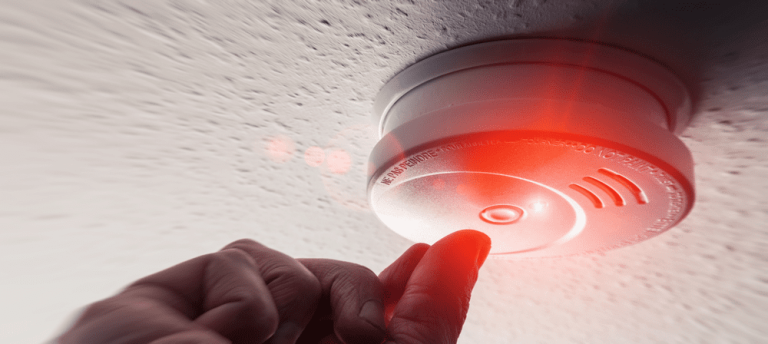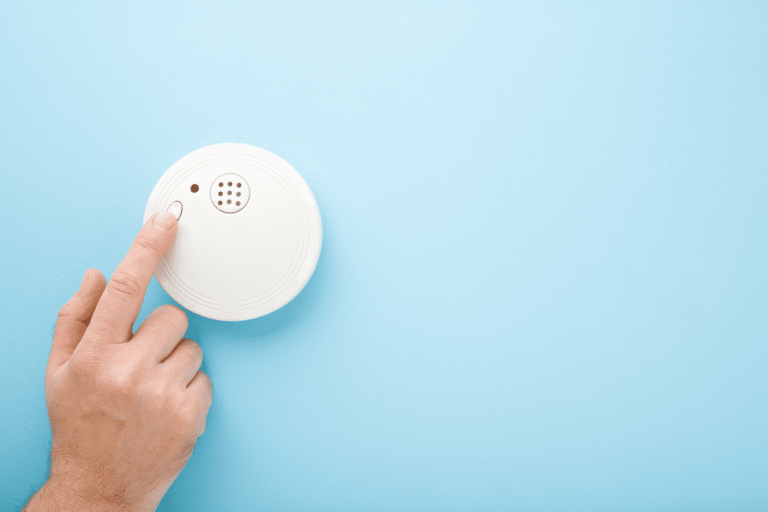What Are the Testing and Maintenance Requirements for Smoke
What Are the Testing and Maintenance Requirements for Smoke Alarms in NSW ?
Considering that NSW witnesses around 6,500 annual domestic fires , it is only natural that the state has implemented stringent legislation regarding installing, testing, and maintaining smoke alarm systems in residential, commercial, and strata properties. Installing smoke alarms on your property is only part of the story. Smoke alarm upkeep is an ongoing process. Testing and maintaining the detection systems is essential to ensure they are working correctly, minimising the chances of false alarms and unresponsiveness.
Read this article to understand the smoke alarm testing and maintenance guidelines in NSW.
Legal Requirements for Smoke Alarms in NSW
Overview of Smoke Alarm Legislation
The National Construction Code (NCC) has different clauses on smoke alarms for buildings from Classes 1 to 9 , encompassing:
- Homes
- Apartments
- Hostels
- Caretakers' residences
- Commercial establishments
- Retail centres
- Storage or wholesale centres
- Factories
- Public buildings
According to the Environmental Planning and Assessment Act 1979 and the Environmental Planning and Assessment Regulation 2000 , all buildings with sleeping areas should have at least one working smoke alarm on every level. The alarms should meet the minimum requirements of AS 3786:2014 .
Installation Requirements
Your smoke alarm installation is legal only when performed by a qualified and licensed electrician. The electrician will get the lay of the land and pinpoint suitable coordinates for effective detection and ample coverage.
Residential Buildings
- Inside each bedroom
- Outside each bedroom
- Living area
- Hallways
- Near the kitchen
- Near the furnace or water heater
- Basement
- Garage
- On every floor of the building
Commercial Buildings
- Hallways and corridors
- Near stairwells and elevators
- Kitchen or break room areas
- Storage rooms
- Mechanical or utility rooms
- Meeting rooms and conference areas
- On every storey of the building
Strata Buildings
- In hallways outside bedrooms
- Near staircases and elevators
- Living rooms and common areas
- Kitchen or dining areas
- Laundry rooms
- Utility or storage spaces
- On every level of the building
Your electrician will fix the smoke alarm on the ceiling or at a decent height on a wall. The alarms cannot be near corners and obstructions. They should also be at a reasonable distance from windows, doors, and vents.
Interconnection and Power Supply
Fire and Rescue NSW advises that new or substantially renovated properties choose interconnected, hardwired smoke alarms with battery backup in case of a power failure.
Testing and Maintenance of Smoke Alarms

Regular Testing Procedures
Monthly — Battery Testing
You will know whether your alarms are operational when you test your batteries regularly. Poorly placed or spent batteries will not alert occupants if a fire breaks out. Press the 'Test' button on your smoke alarm to test the batteries. If it emits a loud, piercing sound, the batteries are working.
Half-Yearly — Vacuuming Dust
If false alarms are becoming a regular nuisance or your smoke alarm performs poorly, it is probably due to dust accumulation. Dust particles obstruct the passage of smoke to the sensor.
Gently vacuum your smoke alarm with a soft, dry brush. Avoid cleaning it with liquids because you might get an electric shock. Do not use abrasive materials either because they can damage delicate components in the alarm. If you are nervous or uncertain about vacuuming your smoke alarm, dial a professional electrician who will clean it without the slightest damage.
Annually — Battery Replacement
The life expectancy of a smoke alarm's battery varies by manufacturer. If your battery is inching towards its expiry date, the alarm's performance will decline and eventually cease. Your electrician will pop the old batteries out and replace them with fresh ones, following the manufacturer's battery replacement guidelines.
Every Ten Years — Smoke Alarm Replacement
Once in ten years, it is time to put your good and faithful smoke alarms to rest. Older smoke alarms that have run their course cannot hold a candle to newer models due to technological advancements as well as wear and tear. Your electrician will choose smoke alarms with lithium batteries for longer-lasting power. They will follow manufacturer instructions and legal best practices when installing new alarms and disposing of old ones.
Testing Responsiveness to Smoke
Your electrician will confirm that your smoke alarm is working, but how? Don't worry. They will not need to get a fire going in your space. Electrical technology has some impressive methods to gauge your smoke alarm's responsiveness.
- Aerosol smoke detector tester The electrician will spritz an aerosol near the alarm. The particles of this aerosol simulate smoke particles. Therefore, they will trigger the sensor.
- Smoke detector test kit Test kits contain handheld devices that generate smoke in controlled amounts. The electrician will direct the smoke towards the alarm to activate its sensor.
- Incense smoke Using a smouldering incense stick, your electrician will introduce controlled smoke into the alarm's vicinity.
- Smoke pencil The electrician will direct a thin, visible stream of non-toxic smoke towards the alarm from an emissive handheld device.
- Test smoke chamber Evaluate the responsiveness of your alarm when the electrician introduces it into a controlled environment that generates smoke.
Responsibilities of Property Owners and Tenants
When you live in an apartment or a rented property, you might wonder who is responsible for ensuring the upkeep of the smoke alarm system. Take a look at the tasks incumbent on landlords, tenants, and the owners' corporation (for strata properties).
Landlord Responsibilities
When your tenant brings smoke alarm issues to your notice, you must resolve the problem within two business days. You must hire electricians for the following services:
- Partial installation
- Whole-unit installation
- Replacement
- Inspection
- Maintenance
Tenant Responsibilities
If you do not own the unit, report any concerns regarding the smoke alarm system to your landlord. If you own the unit, you are entirely responsible for engaging electricians for all tasks related to smoke detectors.
Owners Corporation Responsibilities
In strata buildings, the owners' corporation attends to the entire repertoire of smoke alarm tasks for shared spaces. They will engage an electrician or an electrical company to check on the following:
- Sensitivity. Can the alarm recognise dangerous concentrations of smoke?
- Alarm output. What is the decibel level and audio range of the alarm?
- Battery life. What is the lifespan of the alarm?
- Connectivity. Are the alarms properly connected to one another and the mains?
- Markings. Does the body of the alarm bear the AS 3786:2014 standard, type A for photoelectric, manufacture and replacement dates, and the radioactive symbol?
- Visual inspection. Does the body of your smoke alarm have signs of damage, corrosion, or wear?
- Proximity and placement. Are your smoke alarms installed in appropriate locations and at the correct height and angle?
Throughout the testing and maintenance service, the electrician will maintain records of their activities, including service dates, tests performed, and issues addressed.
Conclusion

The importance of annual smoke alarm testing and regular maintenance cannot be underestimated. The whole purpose of your smoke alarm system is to warn you immediately so that you can protect yourself, your loved ones, your workforce, your tenants, your guests, or your property and possessions from unfortunate fire-related emergencies. Ku-ring-gai Electrical Service offers unrivalled smoke alarm maintenance services to homes, commercial establishments, and strata properties in NSW at honest and transparent prices. A lifetime workmanship guarantee backs all our work. Contact us today for a free quote and schedule a smoke alarm testing service for your property.